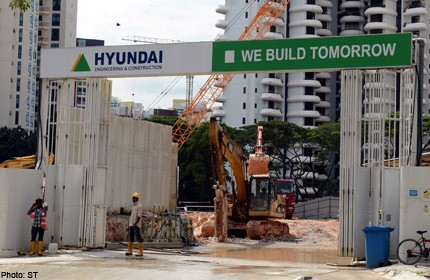Stay cautious on property stocks, investors advised


SINGAPORE - The big property firms knew exactly what was in store on Monday: New measures outlined last on June 28 to rein in mortgage lending would trigger the usual sell-down.
And so it proved with carnage across real estate counters.
City Developments tumbled 1.6 per cent, CapitaLand slumped 2.3 per cent and UOL Group dived 2.7 per cent in that session alone, far underperforming the Straits Times Index, which dipped 0.3 per cent that day.
But property counters have been here before, most recently after tough cooling measures were imposed in January. The knee- jerk sell-down tapers off, the rot stops and investors come back.
Morgan Stanley analysts Sean Gardiner and Wilson Ng noted that real estate shares typically fall 4 to 7 per cent in the first few days of cooling measures being announced and then stabilise.
Shares followed the script this week. City Developments rallied from $10.53 on Monday to $10.75 on Friday, while CapitaLand rebounded from $3.01 to $3.06 in the same period.
Under the new Monetary Authority of Singapore framework, banks have to use a standardised set of guidelines to assess a buyer's eligibility to borrow. Banks will not be able to approve a loan if the monthly repayments of a buyer's total debt obligations exceed 60 per cent of his gross monthly income.
JP Morgan analysts Joy Wang and Ong Choon Keong said in a recent report that while they see some "initial knee-jerk reaction" to the tighter lending rules, the magnitude of the decline is unlikely to be as extreme as the response to tough cooling measures unveiled in January.
They tip that the new framework could affect launches in the near term as buyers and lenders familiarise themselves with the new rules.
They added: "We believe pricing, however, would be much stickier and likely to be affected only in the second half of the year as measures slowly work their way through and as completion starts to pick up."
The January steps to cool the red-hot market included imposing an additional buyer's stamp duty (ABSD) of 7 per cent on Singaporeans buying a second property. Previously, they did not have to pay any ABSD.
The minimum cash deposit for people applying for a second or subsequent mortgage was raised from 10 per cent to 25 per cent. Analysts advise investors to stay cautious on property shares despite this week's rebound.
Daiwa analyst David Lum noted: "The total debt servicing ratio (framework), along with the cumulative impact of the previous seven measures, has increased the risk of a major correction in the residential property market."
Mr Lum expects home prices to decline by 18 to 20 per cent from the end of last year to the end of 2015, mainly due to rising levels of unsold inventory if demand suddenly slows and a record pipeline of new homes comes on the market.
Developers with huge exposure to the residential market will be most at risk, add experts.
Deutsche Bank Markets Research noted: "The residential developers are more vulnerable, with Wing Tai and City Developments having the highest sensitivity to housing prices."
Its preference is for the commercial/integrated developers, which are more insulated from housing market risk and are trading at attractive discounts. Its top pick is CapitaLand.
Deutsche added: "We expect investment demand to cool, with rising downside risk to prices in the medium term."

Get a copy of The Straits Times or go to straitstimes.com for more stories.